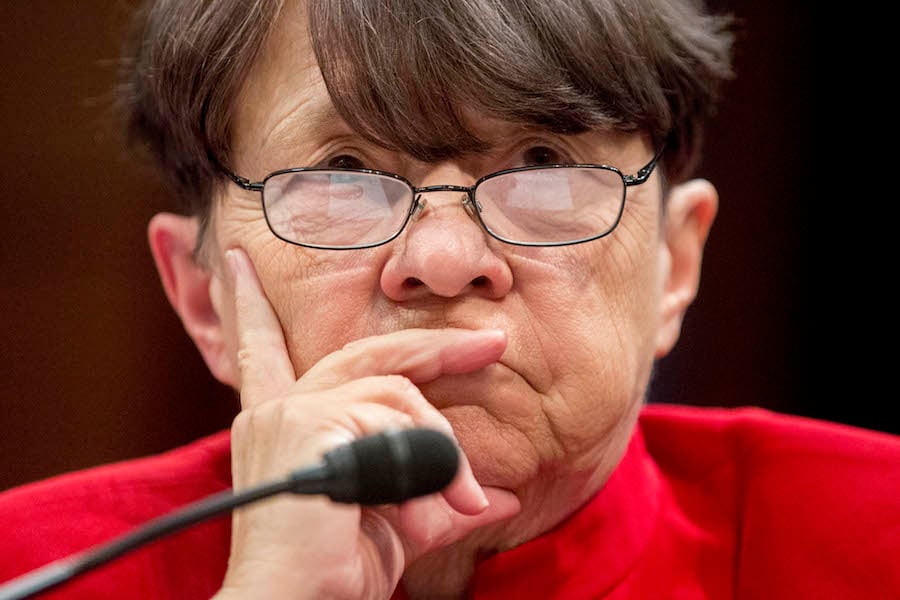A move by the Securities and Exchange Commission to beef up oversight of registered investment advisers probably will not stop the agency's effort to establish third-party examiners as well.
The SEC plans to increase the number of RIA examiners by almost 20% this year — to 630 from 530, according to someone familiar with the initiative.
The increase will be achieved by shifting SEC broker-examination staff to RIA exams and by using a budget increase to hire more RIA examiners. Congressional appropriators gave the agency a $105 million budget increase — to a total of $1.6 billion — for fiscal 2016 in the
recently approved omnibus spending bill.
Strengthening oversight of advisers has long been a priority for SEC Chairman Mary Jo White. The agency examined 10% of the approximately 11,500 registered advisers in fiscal 2015. The current number of broker examiners is about 300.
The SEC and the Financial Industry Regulatory Authority Inc., the industry-funded broker regulator, together examined 51% of approximately 4,500 brokers in fiscal 2015. Finra conducted about 80% of those exams.
Monitoring RIAs is an SEC imperative because of the growth of the industry. A decade ago, there were 8,500 SEC-registered advisers with $24 trillion in assets under management. Those numbers were projected to grow to 12,000 advisers with $65 trillion in AUM in fiscal 2016, according to the agency.
DROP IN THE BUCKET
The SEC is drafting a rule designed to increase adviser examinations by
allowing third parties to conduct them. The reallocation of internal resources to adviser oversight shouldn't stop that rule, according to one of its champions.
“Every little bit can help. It's still a drop in the bucket given the overall population of advisers,” said Daniel Gallagher, president of Patomak Global Partners, a financial services consulting firm and until recently an SEC commissioner. “I don't think [the reallocation] obviates the need for third-party exams, not even close.”
Skip Schweiss, managing director of adviser advocacy and industry affairs at TD Ameritrade Institutional, also wants the SEC to proceed with a third-party exam rule despite the agency's internal rejiggering.
“My hope would be that it doesn't forestall other efforts to bolster RIA exams,” Mr. Schweiss said. “I doubt reallocating 100 examiners will sufficiently address this problem.”
But many advisers are leery of third-party exams, fearing that it could open the door to a self-regulatory organization for advisers and perhaps could result in Finra extending its reach to advisers.
OPPOSITION
The Investment Adviser Association wants the SEC to continue to conduct RIA exams. It opposes third-party assessments because of concerns about the quality of the organizations conducting the exams, the costs to advisers and the confidentiality of the reviews.
Karen Barr, IAA president and chief executive, praised the SEC's internal adjustments, saying they, along with other improvements, “should make a meaningful difference in the examination program.”
She said that move shows that the SEC can handle RIA exams itself.
“It's consistent with what we've been saying all along: Examinations are a government function,” she said. “We agree with [chairwoman] White that SEC examiners are the most qualified to carry out the SEC's investor-protection mission.”
The Financial Planning Coalition favors imposing user fees on advisers to pay for an increase in exams. But it backed the SEC initiative.
“As the expert agency, the SEC is best positioned to examine investment advisers to ensure that they are adhering to their obligations under the [Investment Adviser] Act,” the group said in a statement.
The person familiar with the SEC's reallocation of examination resources did not know how many more RIA exams would be conducted with the shift in SEC manpower. Those reviews have risen from 964 in fiscal 2013 to 1,150 in fiscal 2014 and 1,221 in fiscal 2015. The SEC conducted 493 broker exams in fiscal 2014 and was projected to execute 495 in fiscal 2015.
The decrease in the number of SEC staff doing broker exams probably will put more pressure on Finra to pick up the slack. A Finra spokeswoman declined to comment.
Mr. Schweiss is concerned about the SEC taking its eye off of broker examinations.
“This is not in any way adding to SEC resources,” Mr. Schweiss said. “This is robbing Peter to pay Paul. This is reallocating resources from the broker-oversight side to the RIA-oversight side.”
Even though the SEC and Finra examine half of all broker-dealers each year, the coverage of far-flung brokerage operations is much less.
“[R]egulators are examining well below 1% of the approximately 160,000 branch offices each year,” the SEC stated in its fiscal 2016 budget request.







